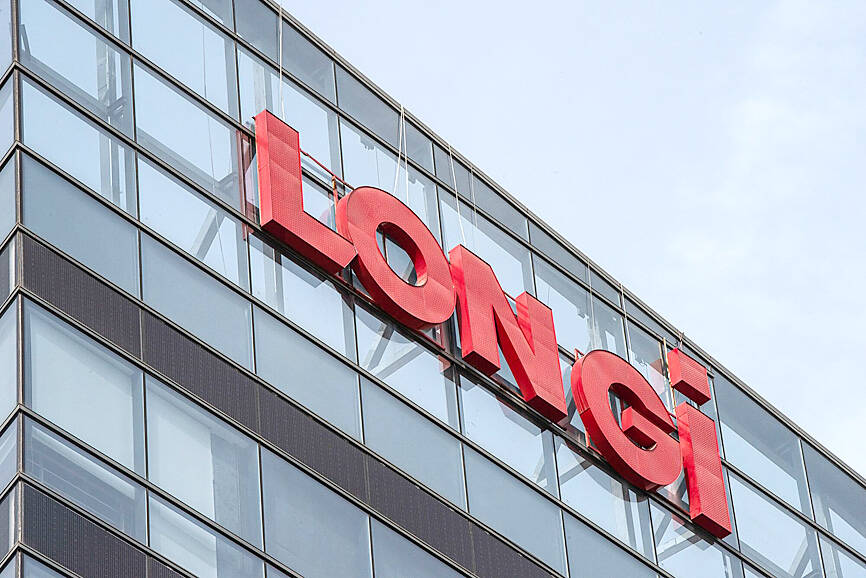China’s Longi Green Technology Energy Co (隆基綠能) — the world’s largest solar manufacturer — is cutting almost one-third of its workforce as it tries to slash costs in an industry struggling with overcapacity and fierce competition, according to people familiar with the matter.
Longi plans to trim as much as 30 percent of its staff that last year totaled about 80,000 people at its peak, several people familiar with the situation, including some briefed by senior management, told Bloomberg.
The move signals an acceleration of job cuts that Longi began in November last year, when it started laying off thousands of people who were mostly management trainees and factory hires, a reaction to years of breakneck expansion across the global solar industry. It isn’t clear how many employees had been dismissed before this latest decision.

Photo: Bloomberg
Xi’an-based Longi isn’t alone: China’s solar industry dominates global manufacturing but has suffered from layoffs and suspended investment plans in recent months. Manufacturers have been forced to sell at or below production costs after prices for solar panels fell to record lows last year. The result is that an industry seen as crucial to the global energy transition is struggling with excessive capacity, consolidation and the possibility of bankruptcies.
Fierce competition has also forced many companies that make wafers — a solar panel precursor that is wired into cells and assembled into modules — to cut production. Longi, a leading wafer producer, had to significantly cut prices last year.
Staff at Longi have seen previous efforts to cut costs fall short, including the cancelation of free afternoon tea, shrinking budgets for business trips and being told to only print in black-and-white unless approved to do otherwise by supervisors, the people said. Longi’s Shanghai office also stopped offering free coffee, two of the people said.
Amid rising internal concerns about job losses by rank-and-file workers, the company late last year disabled an internal function where employees could see the total number of staff, some of the people said.
Beyond the overcapacity and competition issues, there have been other headaches for Longi and the industry: some Chinese manufacturers have had their exports to the US held up over alleged forced labor abuses in China’s Xinjiang region, accusations which Beijing has repeatedly denied. Longi saw its American joint venture in Ohio, which it built with a local partner, face pushback as political tensions between Beijing and Washington rose.
For Longi, the financial pressures sent its net income plunging 44 percent to 2.52 billion yuan (US$350 million) in the third quarter of last year. The company’s shares have fallen about 70 percent from their peak in 2021.

Intel Corp chief executive officer Lip-Bu Tan (陳立武) is expected to meet with Taiwanese suppliers next month in conjunction with the opening of the Computex Taipei trade show, supply chain sources said on Monday. The visit, the first for Tan to Taiwan since assuming his new post last month, would be aimed at enhancing Intel’s ties with suppliers in Taiwan as he attempts to help turn around the struggling US chipmaker, the sources said. Tan is to hold a banquet to celebrate Intel’s 40-year presence in Taiwan before Computex opens on May 20 and invite dozens of Taiwanese suppliers to exchange views

Application-specific integrated circuit designer Faraday Technology Corp (智原) yesterday said that although revenue this quarter would decline 30 percent from last quarter, it retained its full-year forecast of revenue growth of 100 percent. The company attributed the quarterly drop to a slowdown in customers’ production of chips using Faraday’s advanced packaging technology. The company is still confident about its revenue growth this year, given its strong “design-win” — or the projects it won to help customers design their chips, Faraday president Steve Wang (王國雍) told an online earnings conference. “The design-win this year is better than we expected. We believe we will win

Chizuko Kimura has become the first female sushi chef in the world to win a Michelin star, fulfilling a promise she made to her dying husband to continue his legacy. The 54-year-old Japanese chef regained the Michelin star her late husband, Shunei Kimura, won three years ago for their Sushi Shunei restaurant in Paris. For Shunei Kimura, the star was a dream come true. However, the joy was short-lived. He died from cancer just three months later in June 2022. He was 65. The following year, the restaurant in the heart of Montmartre lost its star rating. Chizuko Kimura insisted that the new star is still down

While China’s leaders use their economic and political might to fight US President Donald Trump’s trade war “to the end,” its army of social media soldiers are embarking on a more humorous campaign online. Trump’s tariff blitz has seen Washington and Beijing impose eye-watering duties on imports from the other, fanning a standoff between the economic superpowers that has sparked global recession fears and sent markets into a tailspin. Trump says his policy is a response to years of being “ripped off” by other countries and aims to bring manufacturing to the US, forcing companies to employ US workers. However, China’s online warriors